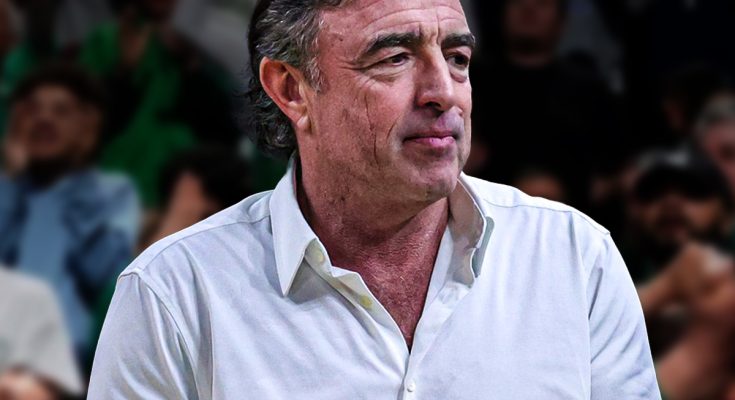Wyc Grousbeck, a figure widely recognized for his pivotal role in steering the Boston Celtics back to prominence, is officially stepping down as governor of the team earlier than initially anticipated. His tenure has been marked by remarkable achievements, both on and off the basketball court, shaping the Celtics into one of the premier franchises in the NBA once again. This decision to step away from the governor’s seat signals the end of an era and invites reflection on the profound impact he has had on the team, the league, and the community surrounding the Celtics.
Grousbeck’s involvement with the Boston Celtics began when he and his ownership group acquired the team in 2002. At that time, the Celtics were struggling both in performance and in financial health, having endured several disappointing seasons and a lack of clear direction. The franchise had a rich history, with legendary players and multiple championships, but the early 2000s were a challenging period for the team. The Celtics were mired in mediocrity and were in danger of losing relevance in a league that was evolving rapidly. It was in this environment that Wyc Grousbeck’s vision and leadership began to take shape.
Under his stewardship, the Celtics embarked on a journey of transformation that involved smart drafting, savvy trades, and a renewed commitment to building a winning culture. Grousbeck’s approach was never about quick fixes or chasing short-term success. Instead, he emphasized patience, strategic planning, and cultivating talent—both on the court and in the front office. One of the most significant moves during his tenure was the trade that brought Kevin Garnett and Ray Allen to Boston in 2007, pairing them with Paul Pierce to form the famed “Big Three.” This move instantly catapulted the Celtics into championship contention and culminated in the 2008 NBA Championship, the franchise’s first title in over two decades.
That championship was more than just a trophy; it symbolized the successful turnaround that Grousbeck and his group had orchestrated. It reaffirmed the Celtics’ place among the elite teams in the league and ignited a resurgence of fan enthusiasm and pride in Boston. The ripple effects extended beyond basketball, boosting the city’s morale and contributing to the local economy through increased attendance, merchandise sales, and media attention. The Celtics’ success became a rallying point for the city, and Grousbeck’s role in that renaissance earned him widespread respect and admiration.
Beyond the championship window, Grousbeck continued to prioritize sustainable success and community engagement. The Celtics organization under his leadership became known for its stability, forward-thinking operations, and strong ties to the Boston community. This included philanthropic efforts, youth basketball programs, and partnerships that reinforced the Celtics as an integral part of the city’s fabric. The team’s commitment to social justice initiatives and community outreach further solidified its reputation as an organization that cared deeply about its impact beyond the hardwood.
Throughout his time as governor, Grousbeck demonstrated an ability to balance business acumen with a genuine passion for basketball and the Celtics’ legacy. He worked closely with key executives and coaches to maintain a competitive roster while navigating the complexities of the NBA’s salary cap, player development, and the ever-changing dynamics of the league. The Celtics remained perennial playoff contenders, even as the team underwent transitions in personnel and coaching staff. Grousbeck’s leadership style was collaborative and thoughtful, fostering a culture where excellence was the expectation and innovation was encouraged.
Despite these successes, the decision to step down earlier than planned comes at a time when the Celtics are at another crossroads. The team is navigating the challenges of blending young talent with veteran leadership, adapting to a league that continues to evolve with new styles of play and emerging stars. The governance change introduces uncertainty but also opens the door for fresh perspectives and new strategies to take the Celtics forward. Grousbeck’s departure does not diminish the foundation he helped build but rather marks a transition to the next chapter of Celtics basketball.
Stepping down sooner than expected may reflect personal considerations or a strategic move to ensure a smooth leadership transition while the team remains competitive. In professional sports, timing is critical, and ensuring that a capable successor is in place to maintain continuity is essential. Grousbeck’s legacy will likely influence how the new governor approaches the role, as the values and culture he instilled continue to resonate throughout the organization.
It is important to understand the broader context of Grousbeck’s decision. Leadership roles in professional sports franchises are demanding, requiring not only a deep knowledge of basketball but also the ability to manage complex business operations, media relations, and community responsibilities. The pressures of maintaining success, managing expectations from fans and stakeholders, and navigating the competitive environment of the NBA can be immense. Stepping down allows Grousbeck to focus on other endeavors or personal priorities while passing the baton to new leadership that can bring renewed energy and ideas to the Celtics.
In reflecting on Grousbeck’s tenure, one cannot overlook the challenges he faced. Taking over a struggling franchise is no easy task, and the pressure to deliver results while honoring the Celtics’ storied history was immense. Yet, through strategic vision, sound decision-making, and an unwavering commitment to excellence, Grousbeck helped transform the Celtics into a modern NBA powerhouse. His impact will be felt for years to come as the team continues to build on the foundation he helped lay.
The Boston Celtics are more than just a basketball team—they are an institution woven into the cultural and social fabric of Boston and the NBA. Under Grousbeck’s leadership, the franchise embraced this role with dignity and purpose, striving to uphold the Celtics’ tradition of excellence while adapting to the demands of a new era. The success of the team during his time as governor serves as a testament to his effective leadership and vision.
As the Celtics prepare for the future without Wyc Grousbeck at the helm, the organization faces both opportunities and challenges. The NBA landscape is highly competitive, with teams constantly evolving through drafts, trades, and free agency. Maintaining a winning team requires foresight, adaptability, and a strong organizational culture—qualities that Grousbeck championed throughout his tenure. The new governor will need to build upon these principles while navigating the unique challenges of the present-day NBA.
In conclusion, Wyc Grousbeck’s decision to step down earlier than expected as governor of the Boston Celtics marks the end of a significant chapter in the franchise’s history. His leadership was instrumental in restoring the Celtics to championship glory, reestablishing the team’s identity, and deepening its ties to the Boston community. While his departure introduces a period of transition, the legacy he leaves behind provides a strong foundation for the future. The Celtics owe much of their recent success and stability to Grousbeck’s vision and dedication, and his influence will undoubtedly continue to shape the team in the years ahead. As Boston Celtics fans and the broader NBA community reflect on his contributions, they can appreciate the remarkable journey that brought the franchise back to the mountaintop and look forward to the new horizons that lie ahead.



